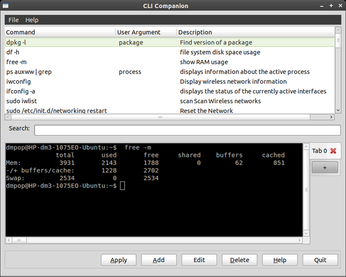Command Line Little Helper: CLI Companion

Productivity Sauce
Whether you are a command line newbie or a proficient terminal user, you'll probably appreciate CLI Companion. This nifty little tool couples the terminal with a database of frequently-used commands. So if you need to execute a specific command, you don't have to type it manually and remember all its parameters. Instead, select the command from the list and hit the Apply button.
CLI Companion comes with a comprehensive list of commands, and you can easily add your own commands to the database. To do this, press the Add button, enter the command in the Command field, and provide an optional description in the Description field. If the command requires user input, specify it in the User Input field. Press OK to save the new entry in the database. By default, custom commands are added at the end of the list, but what if you want to move them at the top? CLI Companion doesn't offer any tools for rearranging entries in the database, there is a simple workaround for this. CLI Companion stores all commands in the ~/.clicompanion text file. Open it in your favorite text editor, and rearrange the commands in the list to your liking.
CLI Companion also provides a handy search feature which can help you to quickly find the command you need. Simply enter the command you want to find in the Search field, and the utility automatically narrows the result as you type.
The CLI Companion project page at Launchpad provides a .deb binary package for Ubuntu and its derivatives. Alternatively, you can add the CLI Companion's PPA and install the utility from it using the following commands:
sudo add-apt-repository ppa:clicompanion-devs/clicompanion-nightlies sudo apt-get update sudo apt-get install clicompanion
Comments
comments powered by DisqusSubscribe to our Linux Newsletters
Find Linux and Open Source Jobs
Subscribe to our ADMIN Newsletters
Support Our Work
Linux Magazine content is made possible with support from readers like you. Please consider contributing when you’ve found an article to be beneficial.

News
-
Linux Mint 22.3 Now Available with New Tools
Linux Mint 22.3 has been released with a pair of new tools for system admins and some pretty cool new features.
-
New Linux Malware Targets Cloud-Based Linux Installations
VoidLink, a new Linux malware, should be of real concern because of its stealth and customization.
-
Say Goodbye to Middle-Mouse Paste
Both Gnome and Firefox have proposed getting rid of a long-time favorite Linux feature.
-
Manjaro 26.0 Primary Desktop Environments Default to Wayland
If you want to stick with X.Org, you'll be limited to the desktop environments you can choose.
-
Mozilla Plans to AI-ify Firefox
With a new CEO in control, Mozilla is doubling down on a strategy of trust, all the while leaning into AI.
-
Gnome Says No to AI-Generated Extensions
If you're a developer wanting to create a new Gnome extension, you'd best set aside that AI code generator, because the extension team will have none of that.
-
Parrot OS Switches to KDE Plasma Desktop
Yet another distro is making the move to the KDE Plasma desktop.
-
TUXEDO Announces Gemini 17
TUXEDO Computers has released the fourth generation of its Gemini laptop with plenty of updates.
-
Two New Distros Adopt Enlightenment
MX Moksha and AV Linux 25 join ranks with Bodhi Linux and embrace the Enlightenment desktop.
-
Solus Linux 4.8 Removes Python 2
Solus Linux 4.8 has been released with the latest Linux kernel, updated desktops, and a key removal.


Other Solution
export PROMPT_COMMAND='history -a;echo -ne "\033]0;${USER}@${HOSTNAME%%.*}:${PWD/$HOME/~}\007"'
export HISTSIZE=500000
CLIcompanion -- more explanation might be helpful
"tasks" that you routinely accomplish with those commands. Often, these tasks are performed at a low frequency and so that associated command often requires re-invention. Features that enable one to store those commands once configured and recall them when needed at a future time, make one's like easier in many ways. I encourage the authors of CLI-Companion to add features to augment shell history features with "helpers". When when tries a new command, CLI-Companion might remember what was tried before and guide the end-user with prompts or questions accompanied with suggestions for suitable command verbs and associated options.
While this article is an informative piece about the existence of CLI-Companion, it might be more valuable if it contained at least one good example of effective use of this interesting tool.
~~~8d;-Dan